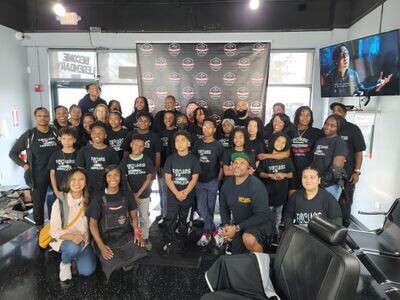Blog
F.O.C.U.O.S. Blogs

By Willie Pole
•
25 Mar, 2024
Every young person possesses a unique set of talents and abilities waiting to be discovered and nurtured. Whether it's a knack for creativity, leadership, or problem-solving, these natural gifts have the power to shape the future and make a positive impact on society. In this blog post, we'll explore some actionable ways that youth can tap into and utilize their natural talents to become productive citizens in society. 1. Self-Reflection and Exploration: The first step in harnessing natural talents is self-reflection and exploration. Encourage youth to take time to reflect on their interests, passions, and strengths. What activities bring them joy? What subjects or topics do they excel in? By exploring different hobbies, extracurricular activities, and academic pursuits, youth can gain a better understanding of their natural talents and how they can be applied in various contexts. 2. Set Goals and Pursue Passions: Once youth have identified their natural talents, encourage them to set goals and pursue their passions with purpose and determination. Whether it's mastering a musical instrument, honing their athletic abilities, or delving into a subject they're passionate about, setting specific, achievable goals can help youth channel their talents into meaningful pursuits and accomplishments. 3. Seek Mentorship and Guidance: Mentorship plays a crucial role in helping youth unlock their full potential and navigate their path to success. Encourage youth to seek out mentors—whether it's a teacher, coach, family member, or community leader—who can offer guidance, support, and valuable insights based on their own experiences. Mentors can provide encouragement, advice, and opportunities for youth to develop and showcase their talents. 4. Embrace Learning and Growth: Learning is a lifelong journey, and embracing a growth mindset is essential for youth to continuously develop and refine their natural talents. Encourage youth to seek out opportunities for learning and growth, whether it's through formal education, extracurricular activities, or hands-on experiences. By embracing challenges, taking risks, and learning from setbacks, youth can cultivate resilience and adaptability—qualities that are essential for success in any endeavor. 5. Volunteer and Give Back: One of the most rewarding ways for youth to utilize their natural talents is by volunteering and giving back to their communities. Whether it's tutoring younger students, organizing a community clean-up, or using their artistic talents to raise awareness for social causes, volunteering provides youth with opportunities to make a positive impact and contribute to the greater good. 6. Pursue Leadership Opportunities: Leadership is another avenue through which youth can leverage their natural talents to effect change and make a difference in society. Encourage youth to seek out leadership opportunities in school, extracurricular activities, and community organizations. Whether it's leading a team, organizing an event, or advocating for social justice, leadership roles empower youth to use their talents to inspire others and drive positive change. 7. Stay Connected and Network: Finally, encourage youth to stay connected and network with others who share their interests and passions. Building a supportive network of peers, mentors, and professionals can open doors to new opportunities, collaborations, and experiences. By connecting with like-minded individuals and fostering meaningful relationships, youth can tap into a wealth of resources and support to further develop and utilize their natural talents. In conclusion, every young person has the potential to make a meaningful contribution to society by tapping into and utilizing their natural talents. By encouraging self-reflection, setting goals, seeking mentorship, embracing learning and growth, volunteering, pursuing leadership opportunities, and staying connected, youth can unleash their full potential and become productive citizens who make a positive impact on the world around them.
By Willie Pole
•
18 Mar, 2024
Problem-solving and critical thinking skills are essential for navigating life's challenges and seizing opportunities. For youth seeking to develop and hone these skills, the key lies in practical application and real-world experience. In this blog post, we'll explore some actionable ways that youth can practice demonstrating and developing their problem-solving and critical thinking abilities. 1. Engage in Puzzles and Brain Teasers: Solving puzzles and brain teasers is an enjoyable and effective way to exercise problem-solving and critical thinking skills. Whether it's a crossword puzzle, Sudoku, or a riddle, these activities encourage youth to think creatively, analyze information, and devise solutions to complex problems. 2. Participate in Group Projects: Collaborating on group projects provides an excellent opportunity for youth to apply their problem-solving and critical thinking skills in a real-world context. Whether it's a school assignment, a community service project, or a group activity at a youth organization like F.O.C.U.O.S., working with others allows youth to brainstorm ideas, consider different perspectives, and find innovative solutions to shared challenges. 3. Volunteer for Community Service: Volunteering for community service not only benefits others but also helps youth develop valuable problem-solving and critical thinking skills. Whether it's organizing a food drive, participating in a beach cleanup, or volunteering at a local charity event, these experiences require youth to think critically about how they can make a positive impact and overcome obstacles along the way. 4. Participate in Debates and Discussions: Engaging in debates and discussions encourages youth to think critically, analyze arguments, and articulate their thoughts effectively. Whether it's a formal debate competition, a classroom discussion, or a debate club meeting, these activities foster critical thinking skills by challenging youth to evaluate evidence, consider opposing viewpoints, and form logical arguments. 5. Take on Leadership Roles: Assuming leadership roles provides youth with opportunities to exercise problem-solving and critical thinking skills in a leadership context. Whether it's leading a student organization, organizing a school event, or spearheading a community initiative, leadership positions require youth to think strategically, make informed decisions, and solve problems creatively to achieve their goals. 6. Participate in STEM Activities: STEM (Science, Technology, Engineering, and Mathematics) activities offer a hands-on approach to problem-solving and critical thinking. Whether it's building a robot, conducting a science experiment, or coding a computer program, these activities challenge youth to apply their analytical skills, think creatively, and solve real-world problems using STEM principles. 7. Seek Mentorship and Guidance: Seeking mentorship and guidance from experienced adults or professionals can provide invaluable support and guidance in developing problem-solving and critical thinking skills. Whether it's a teacher, a coach, a family member, or a mentor from a youth organization like F.O.C.U.O.S., mentors can offer advice, share insights, and provide opportunities for youth to apply their skills in practical ways. In conclusion, developing problem-solving and critical thinking skills is essential for youth to succeed in school, career, and life. By actively engaging in activities that challenge them to think creatively, analyze information, and solve complex problems, youth can cultivate these skills and become confident, resourceful, and resilient individuals. Through practice, perseverance, and a commitment to lifelong learning, youth can unlock their full potential and thrive in an ever-changing world.

By Willie Pole
•
08 Mar, 2024
In today's fast-paced and ever-changing world, acquiring new skills is not only valuable but essential for success. For youth involved in programs like F.O.C.U.O.S., where the focus is on critical skill development, the question often arises: "How can I apply these skills in my everyday life?" In this blog post, we'll explore some practical ways that youth can leverage their newly acquired skills to navigate life's challenges and opportunities. 1. Communication Skills: Effective communication is a cornerstone of success in both personal and professional realms. Whether it's articulating ideas in a team meeting, resolving conflicts with friends or family, or networking at a community event, youth can apply their communication skills to express themselves confidently and build meaningful connections with others. 2. Problem-Solving Skills: Life is full of challenges, both big and small, and having strong problem-solving skills is essential for overcoming them. Whether it's finding creative solutions to academic assignments, navigating conflicts with peers, or tackling real-world problems in their communities, youth can use their problem-solving skills to approach challenges with confidence and resilience. 3. Time Management Skills: With school, extracurricular activities, and personal commitments vying for their attention, youth often find themselves juggling multiple responsibilities. By applying time management skills, such as setting priorities, breaking tasks into manageable chunks, and using tools like planners or digital calendars, youth can effectively manage their time and accomplish their goals more efficiently. 4. Critical Thinking Skills: In a world inundated with information and opinions, critical thinking skills are more important than ever. Youth can apply these skills to evaluate sources of information, analyze complex issues, and make informed decisions in various aspects of their lives, from choosing a college major to navigating social media and news consumption. 5. Leadership Skills: Whether it's leading a group project at school, organizing a community service event, or advocating for a cause they believe in, youth can apply their leadership skills to inspire and mobilize others toward a common goal. By fostering leadership skills, youth can become agents of positive change in their communities and beyond. 6. Resilience: Life is unpredictable, and setbacks are inevitable. However, resilience is the ability to bounce back from adversity stronger than before. Youth can apply resilience skills to navigate setbacks, learn from failures, and persevere in the face of challenges, ultimately emerging stronger and more resilient individuals. 7. Creativity: Creativity is not limited to the arts—it's a valuable skill that can be applied in various aspects of life. Whether it's brainstorming innovative solutions to problems, thinking outside the box in academic pursuits, or pursuing creative hobbies and interests, youth can use their creativity to approach challenges with fresh perspectives and original ideas. In conclusion, the skills that youth acquire through programs like F.O.C.U.O.S. are not only valuable but applicable to various aspects of their everyday lives. By applying communication, problem-solving, time management, critical thinking, leadership, resilience, and creativity skills, youth can navigate life's challenges with confidence, resilience, and a sense of purpose. As they continue to develop and refine these skills, they'll be better equipped to succeed in school, career, and beyond.

By Willie Pole
•
20 Feb, 2024
Mathematics is often seen as a daunting subject, but it doesn't have to be! As educators, mentors, and parents, we have the power to ignite a passion for math in our youth and help them see the beauty and relevance of numbers in everyday life. Here are 10 creative ways to make youth more interested in math: 1. Real-World Applications Show how math relates to real-life situations. Whether it's calculating discounts while shopping, measuring ingredients for a recipe, or budgeting allowance money, demonstrating practical applications of math helps youth understand its relevance and importance. 2. Interactive Learning Engage youth in interactive math activities and games. Whether through educational apps, online math challenges, or board games like Sudoku or Monopoly, interactive learning makes math fun and enjoyable. 3. Hands-On Experiments Conduct hands-on math experiments to demonstrate abstract concepts. From building geometric shapes with straws and marshmallows to measuring distances with a homemade catapult, hands-on activities make math tangible and exciting. 4. Math in Nature Explore the mathematical wonders of nature. From the Fibonacci sequence in sunflowers to the golden ratio in seashells, nature is full of mathematical patterns and phenomena that captivate curiosity and spark interest in math. 5. Math Role Models Introduce youth to inspiring math role models. Whether it's famous mathematicians like Albert Einstein and Ada Lovelace or modern-day mathematicians making waves in their fields, showcasing diverse role models helps youth see themselves reflected in the world of math. 6. Creative Problem-Solving Encourage creative problem-solving skills. Present youth with open-ended math challenges that require critical thinking and creativity to solve. Emphasize that there may be multiple approaches to a problem and that mistakes are an essential part of the learning process. 7. Math in Art and Music Explore the intersection of math, art, and music. From the mathematical principles behind symmetry in art to the rhythmic patterns in music, integrating math into artistic and musical activities broadens youth's understanding of its applications and enhances their creativity. 8. Technology Integration Harness the power of technology to make math interactive and accessible. Whether through educational math apps, online tutorials, or virtual reality experiences, technology offers innovative ways to engage youth in mathematical learning. 9. Peer Collaboration Foster a collaborative learning environment where youth can work together on math projects and activities. Encourage peer teaching and mentorship, as explaining concepts to others reinforces understanding and builds confidence in math skills. 10. Celebrating Achievements Celebrate youth's math achievements and milestones. Recognize their progress and efforts with praise, rewards, and encouragement. Creating a positive and supportive environment boosts confidence and motivation in math. Embracing the Joy of Math By implementing these strategies, we can inspire a lifelong love of math in our youth. Let's empower them to see math not as a daunting challenge but as an exciting adventure full of discovery and possibility. Together, we can unlock the magic of mathematics and equip our youth with the tools they need to succeed in school and beyond.

By Willie Pole
•
09 Feb, 2024
Mathematics – a subject often met with mixed feelings among students. Some find solace in its precision and logic, while others may feel intimidated by its complexities. However, beyond the classroom, math literacy holds immense significance in shaping the future of youth. Let's delve into why math literacy is not just about numbers, but a key to unlocking success in various aspects of life. 1. Foundation for Critical Thinking: Math literacy goes beyond arithmetic; it cultivates critical thinking and problem-solving skills. Through mathematical concepts and reasoning, youth learn to analyze situations, identify patterns, and devise logical solutions – essential skills applicable in all areas of life. 2. Empowerment in Education: Proficiency in math opens doors to educational opportunities. From STEM fields to finance and economics, a strong foundation in math paves the way for higher education and specialized careers, empowering youth to pursue their passions and fulfill their potential. 3. Real-World Applications: Math literacy extends far beyond the confines of the classroom. From budgeting finances and understanding taxes to interpreting data and making informed decisions, mathematical skills are indispensable in navigating the complexities of everyday life. 4. Career Advancement: In today's increasingly data-driven world, math literacy is a valuable asset in the job market. Proficiency in math enhances employability across a wide range of industries, from technology and engineering to healthcare and business management. 5. Fostering Innovation: Math literacy nurtures creativity and innovation. Youth equipped with mathematical skills are better equipped to tackle challenges, explore new ideas, and contribute to advancements in science, technology, and society. 6. Global Competitiveness: In a globally connected world, math literacy is essential for maintaining competitiveness on the international stage. Countries with a strong focus on math education tend to excel in innovation, economic growth, and technological advancement. 7. Promoting Equity and Access: Math literacy serves as a tool for promoting equity and access to opportunities. By ensuring all youth have access to quality math education, regardless of their background or circumstances, we can bridge gaps and create a more inclusive society. 8. Building Confidence and Resilience: Mastering mathematical concepts instills confidence and resilience in youth. Overcoming challenges in math fosters a growth mindset, teaching youth that with perseverance and effort, they can overcome obstacles and achieve success. 9. Preparing for the Future: In an era of rapid technological advancement and automation, math literacy is essential for preparing youth for the jobs of tomorrow. By equipping them with mathematical skills, we empower youth to thrive in a rapidly evolving landscape. 10. Empowering Youth for Success: Ultimately, math literacy is not just about numbers – it's about empowering youth for success in all aspects of life. By fostering a love for math and nurturing mathematical skills, we equip youth with the tools they need to unlock their full potential and shape a brighter future for themselves and their communities. In conclusion, math literacy is a cornerstone of youth empowerment and success. By investing in math education and promoting mathematical skills, we pave the way for a generation of confident, capable, and resilient individuals ready to tackle the challenges of the future. Let's embrace the power of math literacy and unlock endless possibilities for our youth.
By Written by: Dawn Royster
•
28 Dec, 2023
Written by: Dawn Royster Last Sunday, Black and Brown youth from around Bolingbrook and Romeoville gathered to learn about Hospital Careers from physicians, nurses, and lab technicians at UChicago Medicine Advent Health Hospital. Creating opportunities like these for lower-income, at-risk youth was the dream of Founder Willie Pole. Pole launched the non-profit Focus On Critically Using Our Skills, or FOCUOS in 2019. After being incarcerated himself, POLE wanted to create programs that expose local students, young adults, and reentering citizens to their career options and life skills. The program is divided into three groups FOCUOS: On the Horizon- ages 9-15, FOCUOS: On the Future- ages 16-24, and the Adult Re-entry Program. Pole said this is an effort to divert youth from sharing his same fate. Most participants have single mothers and family members who have already gone through incarceration. “I’m working to save people other people from what I experience,” said Pole. “They see me as a father figure, mentor, or uncle. That is what matters.” The program reaches 300 people per year, despite lacking a physical location. Supported by a team of local parents and volunteers, Pole runs FOCUOS out of his basement and relies on donations and the $500 a month he contributes personally, to keep the organization afloat. The group sometimes uses New Life Lutheran Church. Pole does this outside of his job as a paralegal and entrepreneur. He originally operated FOCUOS with friend Damon Neal who passed away earlier this summer. Financial support has remained a major obstacle for the group. With such a small budget FOCUOS will have to start using a waitlist for their programs, due to high demansPole was denied the $1.5 million grant he requested from the American Rescue Plan Act (ARPA) funding Will County received. They recently approved him for $15,000. “We need help,” he said. “We need funding and we need it fast. We’re losing kids.” FOCUOS provides participants with mentorship, weekly tutoring, life skills workshops, field trips, multicultural meals, and career education. Last week, FOCUOS also sent 30 kids to learn about the state government in Springfield. Students toured lawmakers offices and learned about the legislative process. In the past 2 years, FOCUOS has had other monthly activities including getting CPR certified with Bolingbrook Fire Rescue, taking Jiu-Jitsu Classes, going fishing, trying filmmaking, attending STEAM camp, or learning to network. Local resident Annette Clarke said this gives her nephews a chance to see things she never saw as a child. Bolingbrook Fire Department Figher Fighter and Paramedic Tara Moser, has worked with the group for two years. She’s taught FOCUOS student first aid and fire safety and her union has made donations to the organization. “I didn’t want children to be excluded due to the affordability,” said Moser. During the summer, Bolingbrook High School student Jamiya Rent was able to use these skills when her uncle collapsed on a hot day. She checked his pulse, rolled, him to his side, and completed chest compressions. The organization grew quickly after its founding simply from word of mouth, said Board Member Ivy Douglas.“We want to show kids that you don’t have limited options,” she said. ”We try to prepare them for society.” Parent Kerinthia Huff said, “We don’t have as much support as the inner city.” This program closes the gap and builds her son's aspirations. Huff credits Pole with creating a “comfortable environment” where her son can express curiosity. “Willie is doing it all from the heart,” she said. “FOCUOS is a big family,” Pole aims to show kids that they already harbor all the skills they need to succeed. He just introduces them to ways to be independent and use their skills to give back to the community. One of FOCUOS’ latest campaigns was sending local student Trent Rodgers to New York with his band program. Rodgers is an Honor Roll student who plays percussion and hopes to be an Engineer. After learning Rodgers has never left the state, the group came together to try to raise the $2,400 cost. They fundraised $2,100 through candy sales over the past few months but were still $300 short. Laboratory Manager Christopher Kirt, a speaker for Sunday's event, decided to donate the remaining cost to send Trent on the trip. These connections drive the success and importance of FOCUOS. Pole hopes to continue to grow FOCUOS and reach as many kids as possible Support FOCUOS and donate at: https://www.focuos .org/aragraph
5 Years & Growing 2nd Annual gala
Days
Hours
Minutes
Seconds
Email: wp@focuos.org
Phone: 630-729-4329
F.O.C.U.O.S. Copyright © All Rights Reserved.




